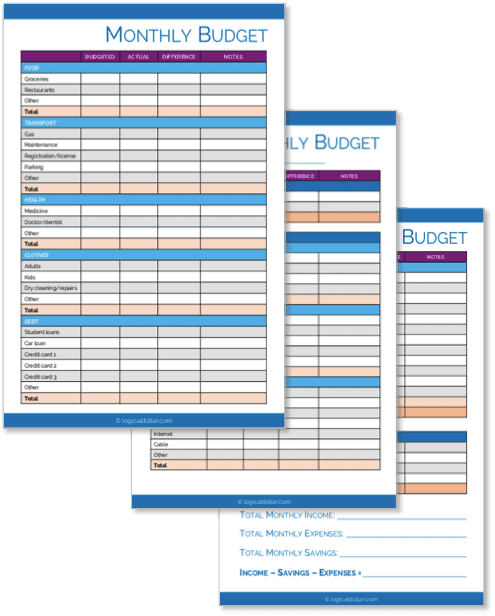As you’d know if you’ve ever tried to work out how to live on a budget, it isn’t always the easiest thing to do.
After all, unexpected expenses arise from time to time. And as each one of them rolls in, you suddenly find your goal of being able to live comfortably on a budget getting further and further away.
Fortunately, there are several steps you can take in order to make it easier to save money, cover your expenses, and prepare for the future – even when living on a tight budget.
Take a look at some of the most effective (and simplest!) suggestions below.
How to live on a budget and save money
If you have run into challenges in the past when it comes to sticking to your budget, you are certainly not alone. I definitely remember times where I felt like I was living on an extreme budget.
Fortunately, those times taught me some great ways you can save money and live on a budget – and you can definitely do the same.
1. Get cashback on your shopping
One of the best ways you can live on a tight budget is to get cashback on your shopping, particularly grocery stores. With food costs being one of the top three expenses in most households, making cuts here can have a significant effect on your overall budget.
And our top pick for this is easily Ibotta. This app gives you cashback at thousands of retailers, whether you shop in-store or online. And given these are things you’d be buying already, it’s a great way to get some money back without any extra effort on your part.
Not to mention that you’ll get a free $20 welcome bonus just for signing up!
Ibotta
Free sign-up bonus: $20
Ibotta’s a completely free app that gives you cash back on what you’re buying already – groceries, medicine, clothes and more.
In fact, users make $150 per year on average – not including your free $20 welcome bonus – with over $682 million having been paid out, so you know Ibotta is definitely legit.
2. Automatically track your spending
If you’re not tracking your spending in detail, it’s going to be impossible for you to know whether you’re actually sticking to your budget. Doing this is also a great way for you to see where you’re going well – and where you may have some problem areas to take a second look at.
This is why you should automatically track your spending. After all, having an app do it for you is so much easier than doing it manually. You have to take a look at your checking account, savings account, debit cards, credit cards, and any automatic drafts.
With all the time this takes, it’s easy to see why many people don’t bother or give up after just a few weeks.

And this is exactly where the Personal Capital app can come in. It’s completely free and allows you to see your entire financial situation in one place.
With access to a free personal financial dashboard, you’ll be able to see all of your accounts, including all of the money that’s coming in and out. You’ll also get personalized financial advice from the app.
By having the Personal Capital app track your spending, you’ll be able to immediately see why you may be having trouble sticking to your budget – and what you can do to rectify the situation.
Personal Capital
Our pick: Best money management app
Easily our choice for the best app to help you manage your money better.
Create a budget, track your spending automatically, receive personalized advice, get alerts about hidden fees and a ton more – and it’s all free.
3. Create a budget
Of course, if you are having trouble working out how to live on a budget, the first thing you have to do is actually make one.
You might be surprised to hear just how many people do not know how to make a budget. Even fewer people actually stick to that budget. To help you out, here are some key categories you should include:
- Savings: How much of your budget do you want to allocate to savings? You need to build up an emergency fund in addition to saving for retirement. An emergency fund is something you tap into if there is a surprise expense, such as a car repair.
- Recurring Expenses: This should be the easiest portion of your budget because you know exactly how much you are going to spend. Recurring expenses are any bills that come up every month no matter what you do. A few items that fall under the category of recurring expenses include housing costs, electric bills, water bills, insurance payments, and any loans you might have. Examples of loans include student loans, car loans, and credit card debt.
- Groceries: Next, include a section for groceries. How much money do you want to allow yourself to spend on groceries every week? Some people prefer to make a budget every two weeks because that is when they get paid, so you may want to average out your grocery spending over that period instead of on a weekly basis.
- Vacation: If you plan on saving for a vacation, you need to add this to your budget. Obviously, a vacation can be expensive. Therefore, you may want to spread out the saving process over several months to make your vacation more affordable.
- Medical Expenses: You might want to create a category for medical expenses. Even if you have health insurance, you may have to pay money for doctor visits, eye doctor visits, and dentist visits. You might have an HSA that can help you pay for this.
- Entertainment: Don’t forget to create a section in your budget for entertainment. Even if you’re trying out living on an extreme budget, it’s important to have even a little bit of fun money. And working out how you have fun on a low budget can really tap into your creative side!
Grab the free budget template below to help you get started straight away.

TAKE BACK CONTROL OF YOUR FINANCES
Our free budget planner will help you to quickly and easily take control of your money – instead of it controlling you.
Get it free for a limited time!
You’ll also join our mailing list to get updates on how to manage your money – unsubscribe at any time at the end of each email.
4. Automatically cut your bills
If you are looking for how to live on a budget to save money, you have to find a way to reduce your bills. Even though you may think your bills cannot be changed, you may be surprised at what you are spending money on.
For example, did you sign up for something a while back that you no longer use? If so, you want to eliminate that.

It could take a long time for you to figure out what type of streaming services or other subscriptions you have signed up for that you no longer use. And that is where Trim can be helpful.
Trim is an application that will take a closer look at where you are spending your money. Then, it will let you know if there is a service you are paying for that you are not using. It can even renegotiate or cancel these for you if it finds better deals – saving you even more time compared to if you had to sit on hold with customer service for hours.
Canceling recurring expenses is a seriously good way to save money. Even though you may think that $5 per month does not matter that much, it adds up quickly if you have 3 or 4 streaming services or subscriptions that fall under this category.
To see just how much money you can save on your bills, grab a free 14-day trial of Trim here.
Related: Truebill Review: How to Cut Your Bills Automatically and Save Money
5. Switch to a fee-free bank account
People have a love/hate relationship with banks. Sure, earning interest is nice. But it can be so tiring when you’re getting charged fees just for using your own money.
If you feel the same way, then you should definitely switch to a fee-free bank account. As mentioned earlier, when it comes to living on a budget, minimizing your recurring expenses can have a major impact over time – and this includes bank fees.
And that is where the CIT Bank Money Market account has become popular. Not only is it completely fee-free, but its interest rate is one of the highest in the market. This makes it great for making sure your savings (including that emergency fund!) are working for you.
CIT Bank – Money Market Account
Our pick: Best high interest savings account
Why? Well, because it’s got:
- 1.00% interest (over 11 times higher than the national average)
- No fees and only a $100 minimum deposit
- FDIC insured, meaning your money’s safe
6. Try a no-spend challenge
One fun thing I’ve tried doing from time to time was something called a no-spend challenge.
The challenge went something like this for me: when I was completely focused on working out how to live on a budget in college, I tried to prevent anything from being drawn out of my bank account for a pre-determined amount of time. I would try to do this for a week or two to get ahead of my budget, like when I knew a major textbook purchase was coming up.

The point of this challenge is that it forces you to save money and get creative. When I tried to complete this challenge, I would look for fun things to do with friends for free, for example. That way, I could still have fun on a low budget!
This is also a common time when I would take a look at the subscription services and cancel the ones I didn’t use. There were some challenges when I could go two weeks without spending any money at all.
So if you’re looking for a way that you can live off no money for a certain period of time, or set a goal to save $1000 a month, this could be for you.
Related: 18 Best Frugal Mom Blogs to Save You Money
7. Start meal planning
As mentioned earlier, saving money on food costs can have a huge effect on whether or not you’re able to live on a budget. While using cashback apps like Ibotta can really help, planning out your meals can also be super useful in helping you to save money at the supermarket.
That is, by planning out which frugal meals you’ll make for the week and then basing your shopping list on the items you need for these, you’ll make sure that you limit your grocery spending to only those things you need. It also helps to avoid food wastage.
Finally, having all the food you need on hand means you’re much less likely to order expensive take out.

There’s no question that it’s worth taking the time each week to sit down and figure out what your household will be eating. That said, this does take some effort and a lot of people tend to give up when they have to keep thinking of what on earth to cook for the week.
This is why I’d seriously recommend looking into the $5 Meal Plan. It costs just $5 per month and you’ll get a full month’s worth of meal plans (including recipes and shopping lists!) sent to your inbox. Even better: each meal costs only around $2 per person.
Given the time and money you’ll save from this, that $5 is more than worth it.
Grab your free 14-day trial of the $5 Meal Plan here to get two weeks of meals plans, recipes and shopping lists at no cost!
8. Automatically apply coupons to your online shopping
Another way you can save money is to automatically apply coupons to your online shopping. If you are tired of quickly running to Google every time you are about to purchase something online to madly search for a discount, there is an application that will do this for you called Honey.
This is an application that uses a browser extension to automatically apply any coupons that it knows about to your online shopping. When you are about to make a purchase on one of its over 30,000 partner sites, the Honey symbol will light up. When that happens, click on it.

The application will quickly run through a list of coupons, applying them to your purchase. Once it finds the largest coupon available that works, you have a winner.
It also compares the cost of the item from different Amazon sellers, just in case you can get a better deal elsewhere.
And the best part is that Honey is entirely free to use! Sign up for Honey here.
9. Consolidate your loans
Do you have multiple loans? You might have a personal loan, a student loan, and even a car loan.
If you are tired of tracking loans with different repayment periods and different interest rates, you need to consolidate them in one place. And we seriously recommend using Credible to help you do just that.

That is, if you want to save money on your loans, you should consider refinancing them and consolidating them into one low monthly payment. You will essentially take out one big loan, replace all of your current loans with that big loan, and pay off that single loan at a lower interest rate.
Because your new loan has a lower interest rate, you will save a lot of money over the lifetime of your loan. That is, if you’re looking to save $10,000 in a year or a similar massive amount, this is going to be one of the best ways to do so. Furthermore, your loans will also be easier to track because you will only have one payment.
Quick tip: If debt is your biggest monthly expense, debt consolidation is a great way to reduce it in a short amount of time. Take two minutes to check out which options Credible has for you based on your personal circumstances.
10. Make homemade gifts
Every Christmas, I feel like I have to spend a small fortune on my Christmas shopping. If you don’t have the spare cash for this (including if you didn’t follow that Christmas saving plan), it can be a major problem for anyone trying to live on a budget
Here’s a story: In my senior year of college, I signed up for a glassblowing class. That year, I did not spend a dime on any of my Christmas shopping because I made all of my Christmas presents for my family in my glass-blowing class.
Fortunately, you do not have to sign up for a class in order to make homemade Christmas gifts. You simply have to get in touch with your creative side. If you would like to save money on birthday and Christmas presents, consider going with something handmade.
For most people, it is the thought that counts. They do not necessarily care how much money you spend on their Christmas gifts or birthday gifts. Get creative and save money by going with homemade presents.
11. Reduce your cell phone plan to only what you use
If you’re trying to live cheap, you should not pay for anything you do not use. Your cell phone plan is probably a prime example of this. For example, if you are paying for data you do not use, this is money you are throwing down the drain.
This is why you should only spend money on your cell phone bill if you are actually using that service. And Republic Wireless is a great way to save money on your cell phone plan.
With Republic Wireless, you don’t have to worry about signing up for long contracts, paying exorbitant fees, or paying for talk and text if you do not use it. You can scale up or back your services as you please.
This means you only have to pay for the cell phone services you actually use, making this a great way for you to save money on your cell phone plan.
Republic Wireless
Our pick: Best prepaid phone plans
12. Look for free offers
Of course, if you would like to save money, you should also look for free offers. For example, you may want to sign up for a mailing list for stores that you commonly used. That way, they can email you if there’s a discount available.
FYI: You can also take advantage of offers available from companies that will send you free products to review to get other free stuff!
Or, you might be able to save money on your travel expenses by signing up for credit cards that provide a big sign-up bonus. You might be able to get a plane ticket or two for free. Finally, a lot of apps will give you points for going out to eat.
If you are someone who likes to go out to eat from time to time, see if there is an app you can use that will give you points for your dining – or that offers cash back when you eat out, like Swagbucks does (which also gives you $5 for free just for signing up!).
Here are some examples of some free offers that are out there:
- Best Amazon Gift Card Deals to Get Free Amazon Credit
- 43 Simple Ways to Get Free Books Mailed to Your Home
- 12 Simple Ways To Get Free Shoes Sent To Your Door
- 17 Easy Ways to Get Furniture for Free
13. Move somewhere with a lower cost of living
We mentioned earlier how food is one of the top three expenses for most households. Well, the biggest expense is usually living costs.
And while it may not always be possible for you to move somewhere cheaper, doing so can have a significant effect on whether or not you’re able to live on a budget.

For example, if you are living in a big city, you may be able to find a cheaper way to live by moving out of the downtown area to an area with lower housing costs. It may not be in the center of the action, but if you can, say, still get a good public transport connection to downtown, you’ll still be able to enjoy that area while also enjoying all those extra savings you have,
And when you can put this money toward other expenses, including retirement, your future self may definitely agree that it’s worthwhile.
How do you live on a tight budget?
If you are living on a tight budget, you may be wondering how you can save money. After all, you can only cut your expenses so much, as much as you try to live stingy.
Fortunately, there are several ways you can make it easier on yourself to live on a tight budget. A few examples include:
1. Pay yourself first
You may believe that you cannot possibly cut your expenses any more than you currently have. There is a good chance that is not the case. Many people find ways to live on less money. You should have the confidence that you can as well.
Therefore, if you are trying to save money, save money before you start spending money during that month. Go ahead and move money into your savings account before you go to the grocery store. If you pay yourself first, you can live on less.
Related: SaveBetter Review: Your Key to High Interest Savings?
2. Use rewards
You can also live on a tight budget by taking advantage of reward opportunities. For example, there are numerous credit cards that will give you an opportunity to build credit while also rewarding you for your shopping.
Start by taking a look at where most of your money goes. Is your biggest expense the grocery store? Or perhaps it’s shopping on Amazon? Then, find a credit card that will give you points for spending in these categories.
You can redeem these points to save money on your purchases. And as an added bonus, check around to find a credit card that doesn’t charge an annual fee.
3. Buy in bulk
When trying to drastically cut expenses, you should also try to purchase your groceries in bulk. Try to find items that are not perishable. This could include frozen vegetables. Then, purchase them in large quantities.
Even though this may cost more money in the beginning, you are actually paying less for each meal. This means, overall, this can be a great strategy for you to reduce your grocery bill.
4. Consolidate your loans
Is debt one of your biggest expenses every month? If so, it may be time to consolidate your loans.
This involves two separate steps. First, consolidating your loans means taking your current loans and rolling them into a single payment. Doing this makes your loans easier to track.
Then, you should also refinance them. If you take out a larger loan, your new lender may be willing to provide you with a lower interest rate.
Therefore, if you can refinance your loans to a lower interest rate, you can save a lot of money on your monthly payment. Check out Credible to find a range of debt consolidation options based on your personal circumstances.
These are just a few of the top ways you can save money while living on a tight budget. If you think carefully about how much money you spend, you might be surprised at how much money you can save every month. This is an opportunity to get creative, save for retirement, and reduce your unnecessary expenses.
You may also be interested in: 11 Great Ways to Save Money Without a Bank Account
What should I eat on a very tight budget?
If you are trying to live on an extreme budget, you may be looking at the prices at grocery stores, wondering what you should eat. Fortunately, there are several cheap foods you can target to save money without sacrificing your nutrition.
A few examples of foods what you should eat on a very tight budget include:
1. Beans
Without a doubt, you should try to stock up on beans. Beans are a great source of nutrition. They are high in protein and contain a variety of vitamins and minerals.
When you go to the grocery store, one of your most expensive purchases is going to be your protein. Obviously, you cannot purchase filet and lobster every night. Therefore, you have to find other sources of protein. For this, beans should be at the top of your list.
2. Eggs
Eggs are another inexpensive source of protein. Furthermore, eggs are also versatile.
In addition to the fact that you can scramble them, you can also add them to a wide variety of recipes to round out the meal. If you are trying to find protein to serve at dinner, there is a good chance you can add eggs to whatever you are cooking.
3. Frozen vegetables
Another tip you have to keep in mind is to buy in bulk. If you can purchase large quantities of items that are not going to go bad quickly, do it, so, you can save money later.
And frozen vegetables are already inexpensive because you can toss them in the freezer, eat them gradually, and save money over the course of a month or two. Furthermore, frozen vegetables have not been packed with salt, which is why frozen vegetables are better than canned vegetables.
In fact, it’s been shown that there is no significant difference in the health benefits of frozen vegetables and fresh vegetables, meaning you’ll be able to still get a wide variety of vitamins and minerals this way.
4. Bananas
Are you someone who loves fruit? They are sweet, healthy, and can even replace dessert.
Unfortunately, some types of food, such as blackberries and raspberries, can be expensive. Bananas, however, are generally very inexpensive. They are actually one of the cheapest items at the grocery store.
If you are looking for fruit that will not break the bank, then reach for bananas.
5. Chicken
Finally, there are some times when you may want to simply eat some meat. When you want to do so, you may be looking at the price of steak and seafood, believing that you cannot afford any meat at the store.
This is why, when you go to the grocery store, reach for chicken as your meat portion. Chicken is healthy, nutritious, and inexpensive.
These are just a few examples of foods you should try to eat if you are trying to live on a tight budget. When you go to the grocery store, the most important thing you have to remember is to stick to your list.
Even a few extra items can break your budget. Therefore, try to avoid going to the grocery store when you are hungry. If you shop while hungry, you will probably purchase things you don’t need.
How much of your income should you live off of?
You should aim to live off 80% of your income, with 50% of this money going towards your needs and 30% going to discretionary expenses. This is based on the 50-20-30 budget rule, which provides that 20% of your income should be allocated to your financial goals.
Of course, if you can dedicate more than 20% of your income to your goals, whether that’s due to earning more or spending less, then this is going to be even better.
In general, however, the 50-20-30 budget works like this, in that you should:
- Take half of your income and devote it to expenses such as rent payments, mortgage payments, and insurance.
- Take 30 percent of your income and devote it to recurring expenses (such as utility bills and gym memberships) and saving for an annual vacation.
- Take the remaining 20 percent of your income and use it to cover your debt payments (such as student loans) and retirement savings.
Of course, everyone’s budget is going to be slightly different. The most important thing to remember is that needs must come before wants.
By the way, this budget is designed to focus on your take-home pay, not your gross pay (which is how much money you make before taxes). You should have just these specific figures based on your income.
The template below is set up for you to use the 50-20-30 budget if you’d like to give it a try.

MANAGE YOUR MONEY LIKE A BOSS
Managing your money effectively can literally change your life. And starting a budget using our budget planner is the first step towards you doing just that.
Get it free for a limited time!
You’ll also join our mailing list to get updates on how to manage your money – unsubscribe at any time at the end of each email.
How to live comfortably on a budget
It’s all well and good to aim towards living on an extreme budget but it’s not going to be sustainable for everyone for a long period of time. That is, by giving yourself some wiggle room, it’s much more likely that you’ll stick to a budget over the long term rather than just giving up and going back to your less-than-stellar spending habits.
This is why it can be helpful to keep some things in mind when looking to live comfortably on a budget.
1. Pay yourself first
We mentioned earlier how paying yourself first is important in any budget, to make sure your financial goals are met each month.
But this also helps you in living comfortably on your budget. After all, it means you know straight away how much money you have for the rest of the month – which means not having to stress about whether every purchase is going to make or break your debt repayments.
2. Keep your eye on the prize
Whether your financial priority is paying off debt, boosting your emergency fund or adding to your retirement account, keeping this in mind can really help you to keep your spending in check.
Sure, that Starbucks coffee every morning with a friend on the way to work may be a nice habit. But so is retiring.
3. Don’t make your budget overly tight
Sticking to your budget is incredibly important for your overall financial goals. But just make sure you give yourself a little bit of breathing room.
Otherwise, at your first slip, you may find yourself giving up. This means that it’s better to allocate a few extra dollars to a certain expense rather than throwing in the towel altogether.
4. Budget some fun money
If you have no room in your budget for any fun at all, you’re unlikely to stick with it. This is why you should add even a small amount for this, just to give you something to look forward to.
5. Find ways to boost your income
Working out how to live on a budget isn’t just about saving more – it can also be about earning more.
So why not look into ways to earn some extra cash? This could involve starting a side hustle or even doing the occasional odd job around your neighborhood for a few extra dollars.
6. Cook at home
We all know getting take out is expensive, but you may be shocked when you add up just how much this can cost over the course of a year.
This is why a very simple solution is to make all your meals at home. Spending money on take out is wasted cash that could be going to other areas of your life, so taking a bit of extra time to make your meals to help you to live comfortably on your budget. In particular, look into what are the most frugal meals you can make to really minimize your costs here.
7. Look into free exercise options
Gym subscriptions can add up over time and really aren’t needed with so many great free options available these days.
YouTube is a gold mine of free workouts, whether you’re looking for cardio, yoga or anything in between. Taking advantage of these can be an easy way to free up some of your spare cash.
(And keeping fit can save you a ton of money in healthcare down the track!)
Final thoughts on how to live on a tight budget
There are plenty of simple strategies you can put in place to live comfortably on a budget. While it may take some adjustments to your usual spending habits at first, it’s not that hard to do once you put the right processes in place in your life.
In fact, it’s more than possible to live a fabulous life on a budget – with a bit of planning and money management.
Sure, you may not be able to do every little thing you’ve ever dreamed of doing. But when we all know why we should save money given the benefits are so clear (saving money! Paying off debt! Securing your retirement!), it’s easy to see why being able to live on a tight budget is so important.

READY FOR MORE?
Join thousands of subscribers in getting regular tips in your inbox on how to take control of your finances and save more money – and, for a limited time, get our free budget planner as a gift!
You’ll also join our mailing list to get updates on how to manage your money – unsubscribe at any time at the end of each email.









